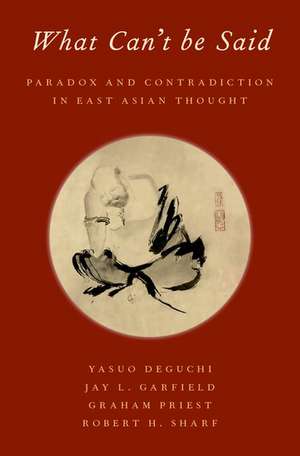What Can't be Said: Paradox and Contradiction in East Asian Thought
Autor Yasuo Deguchi, Jay L. Garfield, Graham Priest, Robert H. Sharfen Limba Engleză Hardback – 21 apr 2021
Preț: 463.72 lei
Preț vechi: 528.86 lei
-12% Nou
Puncte Express: 696
Preț estimativ în valută:
88.74€ • 92.53$ • 73.75£
88.74€ • 92.53$ • 73.75£
Carte disponibilă
Livrare economică 17-24 februarie
Preluare comenzi: 021 569.72.76
Specificații
ISBN-13: 9780197526187
ISBN-10: 0197526187
Pagini: 204
Dimensiuni: 211 x 142 x 23 mm
Greutate: 0.61 kg
Editura: Oxford University Press
Colecția OUP USA
Locul publicării:New York, United States
ISBN-10: 0197526187
Pagini: 204
Dimensiuni: 211 x 142 x 23 mm
Greutate: 0.61 kg
Editura: Oxford University Press
Colecția OUP USA
Locul publicării:New York, United States
Recenzii
In this fascinating new volume, four seasoned professionals of comparative and cross cultural religious philosophy team up to investigate, through key texts in the East Asian tradition, the significance of the violation of the Principle of Noncontradiction and the possibilities it opens up for religious and non religious thought alike.
an invaluable book of reference
The use of paradoxes across East Asian philosophies is well known, but this book is rare in taking those paradoxes seriously, both as claims that reality is indeed contradictory and as philosophical positions that are reasonable and even true. It is a valuable contribution to the growing field of world philosophy.
This is a unique work that takes the issue of 'paradox,' a topic that has thus far been rather scamped in the study of East Asian philosophy, seriously. The authors challenge the assumption that the presence of paradox in premodern texts was due to muddled thinking, and instead consider its significance as intentional and systematic. The chapters are pellucidly clear, focused, and present difficult concepts and translated passages in a coherent way that will be accessible to a wide readership.
Reality is inherently paradoxical, some profound contradictions are true, and East Asian philosophers have understood these matters better than anyone else. That's the thesis of this brilliant collaboration. A must-read for global philosophers and anyone who wants to know what can be said about what can't be said.
This work is a welcome continuation, now applied to East Asian philosophy, of the authors' previous efforts to challenge the tyrannical hegemony of the Principle of Non-Contradiction. The possible implications of this endeavor for everything else we think and do remains one of the most engaging points of contention in current philosophical enquiry. The classical East Asian Daoist and Buddhist thinkers, those great adepts in the arts of ineluctable paradox, are especially relevant for grappling with these questions in a thoroughgoing way, and it is encouraging to see their thought examined in this fine study.
an invaluable book of reference
The use of paradoxes across East Asian philosophies is well known, but this book is rare in taking those paradoxes seriously, both as claims that reality is indeed contradictory and as philosophical positions that are reasonable and even true. It is a valuable contribution to the growing field of world philosophy.
This is a unique work that takes the issue of 'paradox,' a topic that has thus far been rather scamped in the study of East Asian philosophy, seriously. The authors challenge the assumption that the presence of paradox in premodern texts was due to muddled thinking, and instead consider its significance as intentional and systematic. The chapters are pellucidly clear, focused, and present difficult concepts and translated passages in a coherent way that will be accessible to a wide readership.
Reality is inherently paradoxical, some profound contradictions are true, and East Asian philosophers have understood these matters better than anyone else. That's the thesis of this brilliant collaboration. A must-read for global philosophers and anyone who wants to know what can be said about what can't be said.
This work is a welcome continuation, now applied to East Asian philosophy, of the authors' previous efforts to challenge the tyrannical hegemony of the Principle of Non-Contradiction. The possible implications of this endeavor for everything else we think and do remains one of the most engaging points of contention in current philosophical enquiry. The classical East Asian Daoist and Buddhist thinkers, those great adepts in the arts of ineluctable paradox, are especially relevant for grappling with these questions in a thoroughgoing way, and it is encouraging to see their thought examined in this fine study.
Notă biografică
Yasuo Deguchi is Professor of Philosophy and Director of Center for Applied Philosophy & Ethics in the Graduate School of Letters, Director of Unit of Kyoto Initiatives for the Humanities and Social Sciences, Vice Provost, and Deputy Executive Vice-President of Kyoto University.Jay L. Garfield is Doris Silbert Professor in the Humanities and Professor of Philosophy, Logic and Buddhist Studies, Chair of the Philosophy department, and Director of the Logic program at Smith College. He is also Visiting Professor of Buddhist Philosophy at Harvard Divinity School, Professor of Philosophy at Melbourne University and Adjunct Professor of Philosophy at the Central Institute of Higher Tibetan Studies.Graham Priest has held chairs of philosophy in Australia, the UK, and the United States, as well as many visiting positions at universities in Europe and Asia. He is currently Distinguished Professor of Philosophy at the Graduate Center, City University of New York, and Boyce Gibson Professor Emeritus at the University of Melbourne.Robert H. Sharf is D. H. Chen Distinguished Professor of Buddhist Studies in the Department of East Asian Languages and Cultures at the University of California, Berkeley, as well as Chair of Berkeley's Center for Buddhist Studies.
